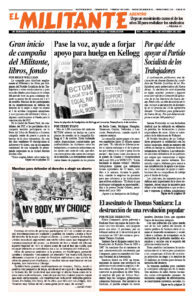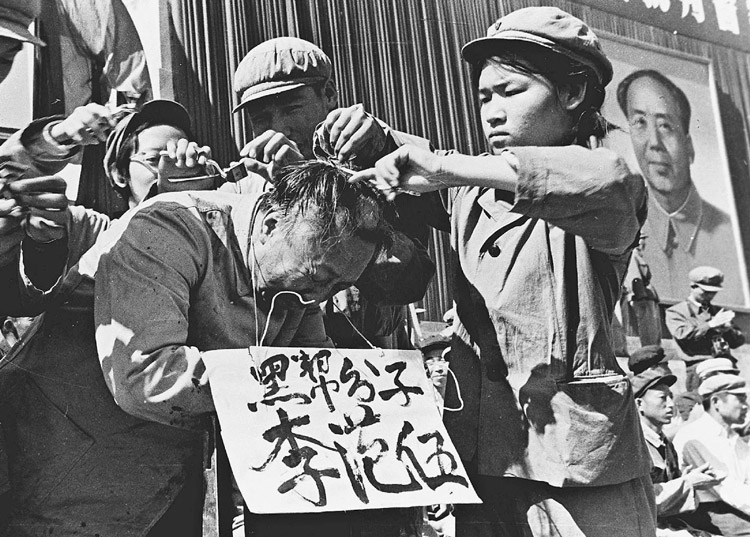Over the past year the Chinese regime of President Xi Jinping has launched a drive to curb the financial clout of some private capitalists and tighten its grip over the state capitalist economy. Xi increasingly presents his policies as the continuation of those of Mao Zedong, the Stalinist leader of the Chinese Communist Party that stood at the head of the 1949 Chinese Revolution and ran the new state for 27 years.
Wearing a tunic reminiscent of Mao, Xi told participants at July’s centenary celebrations of the CCP that “only socialism can save China.” In fact Mao’s policies were always a self-serving justification for the interests of bureaucrats who treated working people as objects to be administered and ruthlessly repressed. The disastrous consequences of Mao’s course included the deaths of millions from famine and the bloody repression of working people and Mao’s opponents in the CCP during the lurches of the so-called Great Leap Forward and Cultural Revolution.
This is the opposite of the working-class trajectory of the Marxist leadership of Cuba’s socialist revolution. Under Fidel Castro and the July 26 Movement, workers and farmers were led to take political power into their own hands and to take on ever-greater control over all aspects of economic and social life, transforming themselves in the process. Working people became conscious actors in history, extending their hand to anti-imperialist struggles around the world.
Today Xi and like-minded party officials fear sharp inequalities in China will spur working-class struggles.
Xi has said that in China “capital serves the people.” A leading CCP financial committee instructed the government “to regulate excessively high incomes” this summer. The government then cracked down on wealthy individuals it accuses of dodging taxes.
It declared “illegal” the grueling 72-hour workweek that bosses subject millions of workers to, and capped rent increases at 5%.
Xi has recently imposed hundreds of regulations aimed at curbing some of the profits of private high-tech companies. State-owned businesses are expanding investments in industries that private companies have dominated, including those related to national security. Xi intervened to prevent billionaire Jack Ma from launching what would have been the largest-ever public offering of shares in his company Ant Group last November.
Mao’s successor, Deng Xiaoping, had begun the expansion of capitalist market relations in the 1980s, leading to the rapid growth of industry, profiteering and a massive expansion of the industrial working class. New cities mushroomed in eastern China. Foreign and Chinese capitalists accumulated vast wealth wrung from the labor of hundreds of millions of workers drawn off the land into the mills and factories.
The parasitic bureaucratic caste running the Chinese state is organized through the ruling party, which has grown to some 90 million. This bloated privileged layer rests on the surplus value drawn from capitalist exploitation of working people.
Today real estate and construction employ nearly a fifth of the labor force. Much of the growth of the capitalist economy in the last decade has been inflated by building apartment towers, in what are now “ghost cities,” sometimes completely vacant. Meanwhile, millions of workers live in substandard housing.
Beijing is trying to check some of the speculation involved in the debt-laden capitalist boom. This has threatened the collapse of the world’s most indebted property developer, Evergrande. Hundreds of Evergrande employees protested outside the company headquarters in Shenzhen last month when the company stopped repaying them the loans it had taken from their bonuses earlier in the year.
Evergrande bosses are being forced to sell off some of their strongest divisions to stay afloat, much of it to the government.
Nervous about these developments, some foreign investors counsel pulling back from their China investments. Others, like U.S. tycoon Elon Musk, have praised Beijing for trying to exert more control.
The rulers in Beijing have clamped down in Hong Kong, banning protests and imprisoning critics. They’ve threatened to invade and subdue Taiwan.
To defend its interests across the Pacific and Asia, the government is expanding its armed forces, sharpening tensions with Washington, which views the Pacific as its “prize” for coming out on top of the imperialist slaughter in World War II.
A key foreign policy initiated by Xi in 2013 is the massive Belt and Road scheme. Through state-bank loans, construction firms are building infrastructure needed by Chinese capitalists along global trading routes to increase their exports and imports.
Infrastructure projects costing $843 billion are spread across 165 countries. AidData says that unreported debts to China from regional governments who contracted with Belt and Road projects amount to another $385 billion.
The government of Laos had to hand over part-ownership of its energy grid worth $600 million to Beijing for loan relief from China-based creditors.
Cuba: example for working people
Beijing’s conduct is in sharp contrast to the selfless internationalism that marks the Cuban government’s foreign policies. In fact, there is a long record of sharp conflicts between the leadership of Cuba’s socialist revolution and Mao and his Stalinist followers who have aligned themselves with counterrevolutionary regimes from apartheid South Africa to Pinochet’s Chile.
The Cuban government mobilized 425,000 volunteers to join the struggle waged by Angolan and Namibian fighters and helped defeat the South African forces, changing the course of African history. Mao and Beijing backed South Africa.
“The repugnant betrayal of the cause of internationalism perpetrated by the Chinese leadership,” Castro said in 1978, “its insane political conduct, and its shameful alliance with the imperialist powers, have been a harsh blow to the progressive forces of the world.
“Vietnam, Angola and Cuba — small countries that won solid, recognized prestige in the world with their acts of heroism, past and present, in their resolute, firm, unwavering struggle against imperialism — are now victims of brutal attacks, hostility and slander from the traitorous Chinese leadership.”
“Sooner or later,” Castro concluded, “the hard-working, militant, self-sacrificing, heroic and revolutionary Chinese people will settle accounts with the traitors who have dropped their beautiful internationalist banners at the feet of imperialism.”
Fear of coming working-class struggles today drives the glorification of Mao and other policies of the Xi regime.


